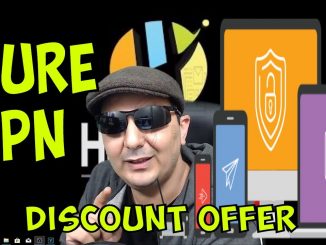
Create your own Security Suite beyond Anti-Virus
Technology has surpassed our expectations, despite forecasts and predictions of what the next ten years will be like, the digital age has always stunned us with its exponential growth rate. While we’re not really into the Jetsons age yet, almost everything we do is somehow related to the internet, from our car screens, refrigerators, to interactive devices that speak to you and moreover do tasks for you such as book a movie ticket or suggest a movie.
Now even your watch is connected to the internet. It may not be a concern for an ordinary person who thinks his information is not so important to be secured, but intentionally or unintentionally, we do provide our sensitive information, such as banking details, addresses and numbers. What more? Even your exact location can be tracked.

If you give the above image a look, its mind boggling to see how the telephone took 75 years to reach 50 million users compared to 35 days for Angry birds. That’s the power of the internet! With so much of influence over our lives cyber security, most users may not go further than simply downloading a free anti-virus software.
Just downloading an antivirus is not enough, multiple security measures have to be taken in place. There is a persistent threat from hackers as immeasurable viruses are made every day; there are many ways that your cyber security can be compromised.
Here we talk about building your own fool proof cyber security suite so that once and for all you are completely protected from any intrusion or cyber-attack. In addition to having, an antivirus there is more to protecting and securing your web presence.
Installing a firewall

There is a defined set of security rules over which it is decided whether to allow or block specific traffic. A firewall security device monitors the incoming and outgoing traffic. It creates a barrier between you and any unauthorized program trying to access your computer.
You should definitely install a firewall on your computer, but before that let’s dig a little deeper into the types of firewalls
Stateful inspection firewall
This type of firewall makes decision based on both system and user defined, all activity is measured from opening of the connection till it’s closed. It is now thought of as a traditional firewall.
Proxy firewall
This is an early kind of firewall device, as it acts as a gateway from one network to another for a particular application. It provides additional features such as caching content and security by avoiding direct connections from outside the network.
Unified threat management (UTM) firewall
UTMs mainly focuses on easy operation and simplicity, and it uses a stateful firewall along with intrusion prevention and antivirus.
Next-generation firewall (NGFW)
As threats and attacks are becoming more and more advanced, companies are now developing firewalls to block the latest malware and application layer attacks.
According to Gartner, Inc.’s definition, a next-generation firewall must include:
- Standard firewall capabilities like stateful inspection
- Integrated intrusion prevention
- Application awareness and control to see and block risky apps
- Upgrade paths to include future information feeds
- Techniques to address evolving security threats
Threat-focused NGFW
It includes all the features of a NGFW added with advanced detection make remediation. The benefits of having a threat focused NGFW are:
- It tells you which assets are at high risk
- It instantly reacts to attacks as it is equipped with intelligent security automation that has fixed policies and tightens your defenses
- Evasive or suspicions activities can be detected easily
- Drastically decreases detection time to clean up system
- Reduced complexity and easy administration
Install an Anti-spyware software
A spyware is a program that acquires information of an individual or an organization without permission, this information is then sent to a third party website. The way spywares are designed makes them a difficult task to be removed. Spyware is also used by people to steal affiliate credits by directing you to other websites that offer credit if you bring traffic to their pages.
They generate pop up ads and hog RAM and processor performance. Furthermore, it can make changes in your browser such as displaying an ad every time you open it. It can also record words you type, which includes passwords as well.
Anti-spyware software is dedicated to only and solely detect spywares. Like anti-virus software, they offer real time security by scanning all incoming data and blocking it once detected.
 Using complex passwords

There are many methods your passwords can be revealed. Sometimes manually and others by devices that generate an infinite combination of passwords to access your system, as some people use very predictable passwords such as date of birth or a beloved’s name.
The key rule here is to use a mixture of lowercase and uppercase letters, numbers and special characters. Your password should be at least 8 characters or more and don’t, “PLEASE DON’T “use any predictable words.
Check your browser’s settings
Different browsers have different privacy and security default settings, so it’s advisable to go through the privacy and security settings. The latest browsers have the ability to protect your movements from being monitored by websites.
Back up data
This is one of the most important factors in securing your information, even if it’s stolen or deleted. At least a backup will reduce the damage, now a days there are multiple cloud services that offer space but it’s advisable to trust only the most reputable companies. Furthermore, it is also important to store your data in a physical form such as a USB or and external hard drive.
Use Encryption Software
Your data is of precious value and if given in the wrong hands, all hell would break loose. Many cyber criminals use your data for extortion or use it for their own advantage. One way of stopping this from happening is by using encryption software. Some of the best VPN services offer encryption, usually AES 256-bit encryption, which is perhaps the strongest form available to date.
Too good to be true? Than it definitely is.
If you have used the internet even a couple of times only, you’ll be familiar with deals that are too good to be true, labelled as “pay shipping only†or “share this link with 10 people and win a trip to Venice†or “buy within 24 hours to avail 90% discount†all such deals are knock offs. The worse thing that can happen is, some sites may attract you with such deals and once they have your credit card information, they simply disappear.
Update system software time to time
It’s the best practice to turn on system updates to automatic mode, as security concerns increase day by day. The computers operating system are also being updated frequently to protect you.
Protection during online gaming

There are literally millions of online gaming fans, who are ready to spend thousands of dollars on system updates, but when it comes to protection, very few take it seriously.
In Massive Multiplayer Online Role Playing Games (MMORPGs or MMOs), the existence of such a huge online community of anonymous players with unmoderated discussions can result in such a large online community of anonymous strangers. Â Similarly, the unfiltered, unmoderated discussions, can pose a variety of potential risks such as giving away personal information, including password, email or home address or age.
Downloading ‘cheats’ can lead to various threats as they often contain viruses/spyware. Using pirated copies of games can also result in unwanted privacy threat. Most of these pirated copies contain malware that can steal your data and damage your system.
Safe Gaming
- Play online games only when you have all security measures taken care of
- Do not use pirated versions of the game
- Buy from reputable sources
- Don’t reveal any personal information
Ransomware

It is a type of malware that enables criminals to lock your computer from a faraway destination. Then it displays a pop-up window informing the owner that it will not be unlocked until a ransom is paid.
In some cases, the only unlocked part of the computer is the number keypad to enter a PIN to enable payment to the criminals. The popular varieties of ransomware in recent times are CryptoLocker and WannaCry.
In addition to that, an accusation of illegal activity or a pornographic image appears while your screen is locked, making it difficult for users to seek help.
Your computer could be infected by ransomware such as CryptoLocker or WannaCry when you inadvertently if you:
- Click on a malicious link in an email, instant message, social networking site or other website
- Visit a corrupt website – these are often of a pornographic nature
- Opening infected files from web-based digital file delivery companies
- Opening corrupt macros in application documents (word processing, spreadsheets, etc.)
- Connecting corrupt USBconnected devices
- Using corrupt CDs/DVDs
Avoiding Ransomware
- Do not reply to, or click on in unrecognized emails
- Visit only reputable website
- Keep all applications updated
- Make sure you have effective and updated antivirus/antispyware software and firewall ..
If you have ransomware on your computer
- Run a full system scan to detect and remove ransomware and other malicious software that may be installed on your computer
- Seek professional advice from a trustworthy source
If it’s too sensitive, avoid keeping it in your device
From personal experience, which I would not get into, this is one of the most important tips to securing yourself. If the data is too sensitive, do not keep it in your device. Store it externally such as USB or external hard drive, make multiple digital and physical copies.
Conclusion
When it comes to cybersecurity, in this age it is a must. More important than the lock on your door, because in the cyber world it is impossible to catch intruders and criminals who are masked by different methodologies. Day by day these criminals advance themselves and thousands of developments are taking place every second.
Therefore to fully secure your online presence follow the above guidelines. And remember if it’s too good to be true, than it is.
Written by By Shoaib Usman Twitter Profile: https://twitter.com/ShoaibVR46 Author Bio: A digital marketer by profession, writer and blogger by passion. Shoaib Usman writes on Online privacy and safety and about the latest trends in technology. Talking about technology is what gives him joy. Follow him on Twitter and for more of his work.





Be the first to comment